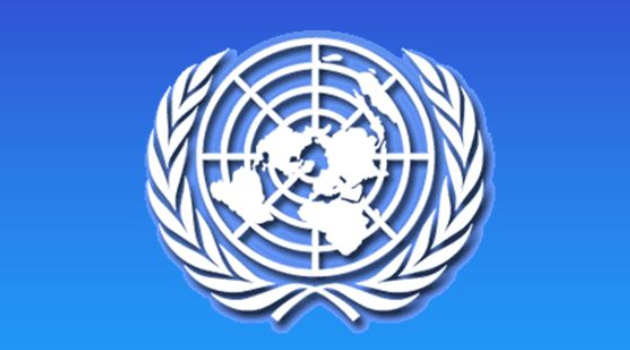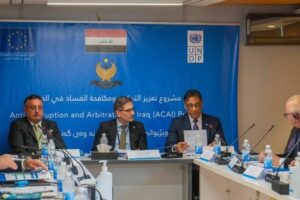
From the United Nations (Iraq):
The BEIT Project Integrates Policy, Legal Frameworks, and Practical Solutions to Address Iraq’s Housing and Employment Challenges
The Building Equitable and Inclusive Transformation (BEIT) towards Decent Work and Affordable Housing in Iraq project held its second Steering Committee Meeting in Baghdad. In his opening remarks, Dr. Mohamed Mohsen Al Sayed, Director General of the Local and Regional Development Directorate at the Ministry of Planning and Chair of the meeting, said:
“The BEIT project is one of the important initiatives to provide adequate and affordable housing, contributing to addressing the housing crisis through collaboration between the Ministry of Planning, the relevant ministries, and international organizations.”
Under the leadership of the Ministry of Planning (MoP) and in collaboration with UN-Habitat, the International Labour Organization (ILO), and the International Trade Centre (ITC), the European Union-funded BEIT project is driving systemic changes that position housing as a catalyst for sustainable growth. The project addresses housing deficits through increased supply and affordability; tackles unemployment through job creation, improved working conditions, and enhanced professional skills; and strengthens the sector through innovation and capacity-building for a greener and more sustainable housing market.
Mr. Ali Al-Naseri, Programme Manager for the cooperation section of EU Delegation to Iraq, highlighted the EU’s support, saying:
“The European Union, through the BEIT project, is committed to an integrated approach that interlinks social protection, decent work, and green growth, strengthening governance while ensuring that individuals and communities play an active role in the recovery process in Iraq.”
In the past year, BEIT has continued to strive to support the Government of Iraq to embed development strategies into the policy and legal framework relating to affordable housing for lasting impact, while showcasing practical examples that demonstrate feasibility and scalability.
Significant progress achieved in 2025
The launch of the Iraq National Housing Policy in October, developed with UN-Habitat’s support, reflected the government’s commitment to sustainable, inclusive, and affordable housing nationwide. Its principles will soon be put into practice through the construction of 200 pilot housing units in Mosul and Ramadi, designed to meet green and affordable standards. From policy formulation to pilot implementation in post-conflict areas, UN-Habitat is helping Iraq demonstrate that housing can be both sustainable and cost-effective while reducing the national housing shortage.
Housing development also drives job creation and demands better working conditions. The International Labour Organization (ILO) has strengthened labour market institutions and advanced decent work, providing technical support to reform labour laws and reinforce governance frameworks. In 2025, 702 government officials, workers, and employers directly benefited from ILO capacity-building initiatives, while thousands more were reached through the national “Safe Work” campaign on occupational safety. The ILO also finalized the National Public Works Programme roadmap, organized Iraq’s first National Conference on Occupational Heat Stress, established a Tripartite Task Force on Child Labour, and launched the National Forum for Social Dialogue, marking major progress toward safer, fairer, and more inclusive employment in Iraq.
To ensure the sector meets growing demand with sustainability and competitiveness, ITC is enhancing Iraq’s regulatory and business environment for construction. Through investment facilitation reforms, procurement improvements, and value-chain-based reports on construction services informed by firms and consumer surveys, ITC has identified opportunities for Micro, Small, and Medium Enterprises (MSMEs) to promote innovation and attract sustainable investments. ITC has also introduced a national energy auditing tool ‘AuditmyBEIT’ to improve building performance and accelerate Iraq’s clean energy transition. Complementary capacity-building programmes on solar energy, thermal insulation, and retrofitting techniques are strengthening national expertise and promoting climate-adaptive construction.
Strengthening coordination and sustainable impact
The Steering Committee served as a platform for partners to guide, reflect on progress and discuss coordinated actions to ensure sustainable results. By aligning policy reform with on-the-ground solutions, BEIT is strengthening Iraq’s capacity to create conditions for affordable housing, decent employment, climate resilience, and inclusive economic growth. Stakeholders reaffirmed their joint commitment to scale up pilot housing models, promote climate-resilient construction, and strengthen decent work across Iraq’s construction and housing sectors.
About BEIT
Building Equitable and Inclusive Transformation (BEIT) is a European Union-funded project jointly implemented by UN-Habitat, the International Labour Organization (ILO), and the International Trade Centre (ITC). The Project aims to drive sustainable economic growth by creating decent employment opportunities through the advancement of Iraq’s affordable and green housing initiatives and the strengthening of the construction sector.





